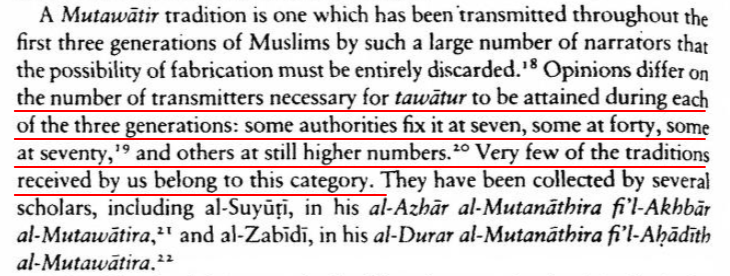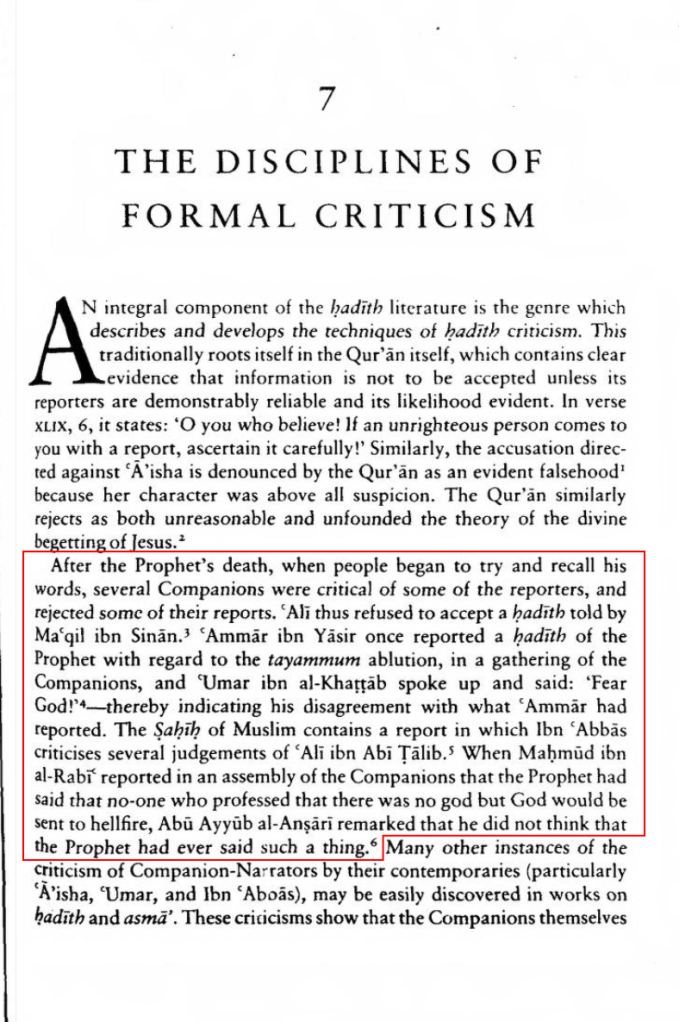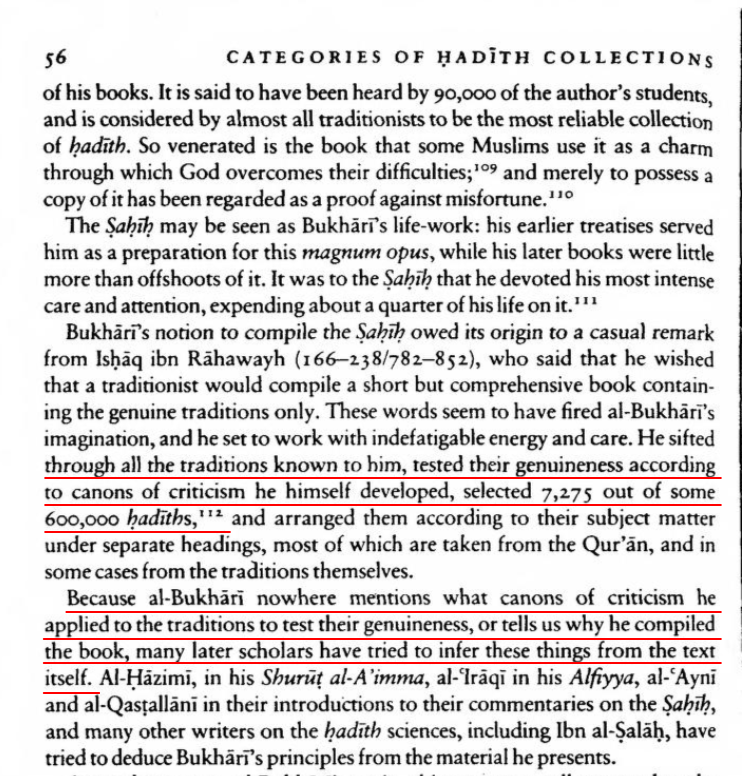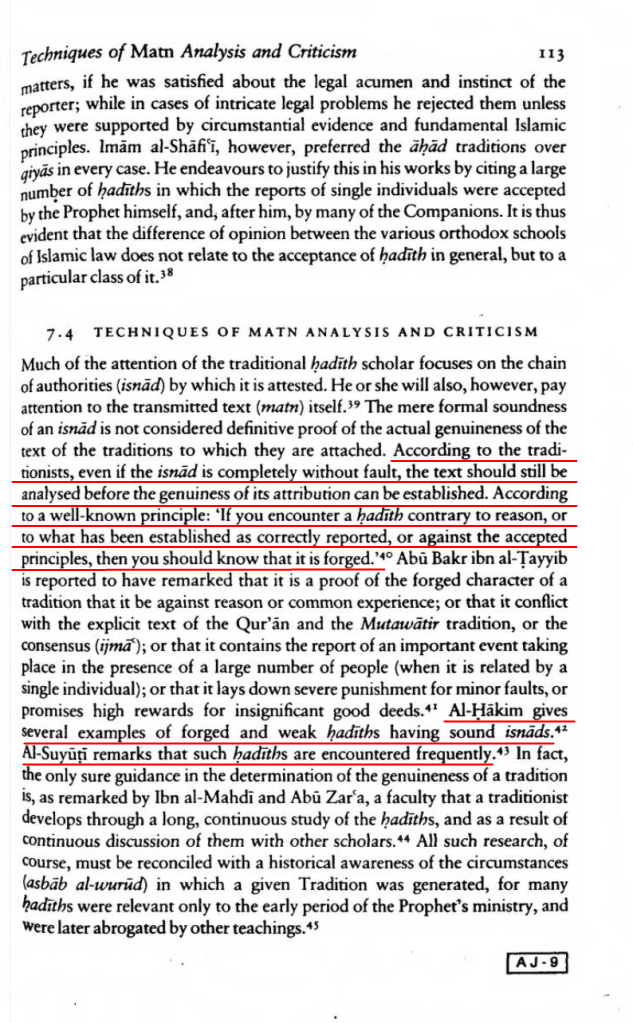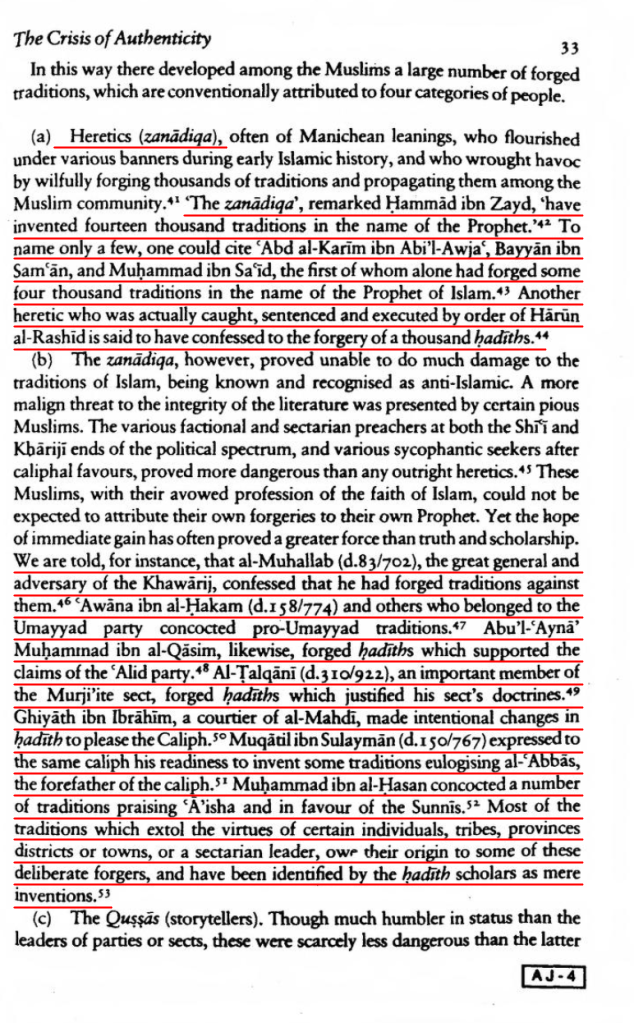The following excerpts of interest from the book “Hadith Literature, Its Origin, Development & Special Features” by Muhammad Zubayr Siddiqi.
Companions Weary of HAdith
“Abu Bakr, when Caliph, was concerned to learn hadiths, but was careful not to accept the words of those who reported them without an independent witness. He also asked Muslims not to relate traditions which might cause discord among them [see reference below].” – p. 23

Note: There was no formal effort to compile and preserve the Hadith like there was for the Quran during the reign of the four Caliphs. Not only that, but it looks like an active effort was made by them to reduce the spreading of Hadith.
“Bukhari mentions a hadith related from the ‘book’ of Abd Allah ibn Abi Awfa, while Abu Bakr, the first Caliph, is reported to have collected five hundred hadiths, which he later destroyed because he suspected that it contained some hadiths related by unreliable people.” – p. 24

“Umar ibn al-Khattab meant the hadith of the Prophet when he asked his companions not to narrate too many hadiths.” – p.1

Narrated ‘Ubaidullah bin `Abdullah: Ibn `Abbas said, “When the ailment of the Prophet (ﷺ) became worse, he said, ‘Bring for me (writing) paper and I will write for you a statement after which you will not go astray.’ But `Umar said, ‘The Prophet is seriously ill, and we have got Allah’s Book with us, and that is sufficient for us.’ But the companions of the Prophet (ﷺ) differed about this, and there was a hue and cry. On that, the Prophet (ﷺ) said to them, ‘Go away (and leave me alone). It is not right that you should quarrel in front of me.” Ibn `Abbas came out saying, “It was most unfortunate (a great disaster) that Allah’s Messenger (ﷺ) was prevented from writing that statement for them because of their disagreement and noise.
حَدَّثَنَا يَحْيَى بْنُ سُلَيْمَانَ، قَالَ حَدَّثَنِي ابْنُ وَهْبٍ، قَالَ أَخْبَرَنِي يُونُسُ، عَنِ ابْنِ شِهَابٍ، عَنْ عُبَيْدِ اللَّهِ بْنِ عَبْدِ اللَّهِ، عَنِ ابْنِ عَبَّاسٍ، قَالَ لَمَّا اشْتَدَّ بِالنَّبِيِّ صلى الله عليه وسلم وَجَعُهُ قَالَ ” ائْتُونِي بِكِتَابٍ أَكْتُبُ لَكُمْ كِتَابًا لاَ تَضِلُّوا بَعْدَهُ ”. قَالَ عُمَرُ إِنَّ النَّبِيَّ صلى الله عليه وسلم غَلَبَهُ الْوَجَعُ وَعِنْدَنَا كِتَابُ اللَّهِ حَسْبُنَا فَاخْتَلَفُوا وَكَثُرَ اللَّغَطُ. قَالَ ” قُومُوا عَنِّي، وَلاَ يَنْبَغِي عِنْدِي التَّنَازُعُ ”. فَخَرَجَ ابْنُ عَبَّاسٍ يَقُولُ إِنَّ الرَّزِيَّةَ كُلَّ الرَّزِيَّةِ مَا حَالَ بَيْنَ رَسُولِ اللَّهِ صلى الله عليه وسلم وَبَيْنَ كِتَابِهِ.
Sahih al-Bukhari 114
https://sunnah.com/bukhari:114
Umar, the second Caliph, carefully followed the example set by his predecessor; for instance, he obliged al-Mughira ibn Shu’ba, Abu Musa al-Ash’ari, Amir ibn Umayya, and Ubayy ibn Ka’b to produce witnesses to corroborate the traditions they narrated, despite the great esteem in which they were held. He is even said to have briefly imprisoned Ibn Mas’ud, Abu’l-Darda and Abu Mas’ud al-Ansari because they related too many traditions.” – p. 23

“Not all these Companions related the hadiths of their teacher [the prophet]. The Musnad of Abu ‘Abd al-Rahman referred to previously, which is said to have been the largest collection of hadiths, was said to contain traditions related by only 1,300 companions. Ibn al-Jawzi, who provides a list of all the Companions who related traditions, gives the names of about 1,060 together with the number of hadiths related by each. Five hundred of them are said to have related one hadith a piece; a hundred and thirty-two are stated to have handed down two traditions each, thirty-two, five each, twenty-six, search each, twenty-seven, seven each, eighteen, eight each, and eleven, nine traditions each,” Sixty Companions are credited with having related 10-20 hadiths a piece; the remainder [123], listed in the table below, have all related twenty or more each.” – p. 15
“The Islamic scholars are not in agreement, however, on the exact qualifications necessary for being a sahabi. Some have held that every Muslim who saw the Prophet was a Companion. Others have thought that only through long association with him could one join this category.” – p. 14
“The exact number of Companions cannot, of course, be determined. Only once during the early years of Islam was a ‘census’ taken, when they were found to be 1,525. This census must have been done at about the time of the Treaty of Hudaybiya, when the danger to the Muslims was great, and an estimate of their actual strength seemed called for.” p.14
“Forty thousand of them were present, when he performed the Farewell Pilgrimage at Mecca. The number of all those who ever saw him has been estimated by Abu Zar’a al-Razi at above 100,000.” – p.15
| Number of Companions (Lower Bound Estimate) | # of Hadith Narrated | % |
| 40,000 | 0 | 97.42% |
| 500 | 1 | 1.22% |
| 132 | 2 | 0.32% |
| 80 | 3 | 0.19% |
| 52 | 4 | 0.13% |
| 32 | 5 | 0.08% |
| 26 | 6 | 0.06% |
| 27 | 7 | 0.07% |
| 18 | 8 | 0.04% |
| 11 | 9 | 0.03% |
| 60 | 10-20 | 0.15% |
| 123 | 20+ | 0.30% |
| Number of Companions (Upper Bound Estimate) | # of Hadith Narrated | % |
| 100,000 | 0 | 98.95% |
| 500 | 1 | 0.49% |
| 132 | 2 | 0.13% |
| 80 | 3 | 0.08% |
| 52 | 4 | 0.05% |
| 32 | 5 | 0.03% |
| 26 | 6 | 0.03% |
| 27 | 7 | 0.03% |
| 18 | 8 | 0.02% |
| 11 | 9 | 0.01% |
| 60 | 10-20 | 0.06% |
| 123 | 20+ | 0.12% |
*Note: The vast majority of Companions did not narrate Hadith. Only 123 Companions narrated 20 or more Hadith
| Ranking | Name | # Narrated |
| 123 | Abu Shurayh al-Kabi | 20 |
| 122 | Abd Allah ibn Jarrad | 20 |
| 121 | Musawwir ibn Makhrama | 20 |
| 120 | Amr ibn Umayya al-Damrl | 20 |
| 119 | Amr ibn Umayya (another) | 20 |
| 118 | Safwan ibn ‘Assal | 20 |
| 117 | Sa’d ibn ‘Ubada | 21 |
| 116 | al-Rabi | 21 |
| 115 | al-Sa’ib | 22 |
| 114 | Qurra | 22 |
| 113 | ‘Umayr ibn Rabi’a | 22 |
| 112 | Umm Qays | 24 |
| 111 | Laqit ibn ‘Amir | 24 |
| 110 | al-Sharid | 24 |
| 109 | Rifa’a ibn Rafi’ | 24 |
| 108 | Abd Allah ibn Unays | 24 |
| 107 | Aws ibn Aws | 24 |
| 106 | al-Fadl ibn ‘Abbas | 24 |
| 105 | Abu Waqid al-Laythi | 24 |
| 104 | Abu Talha al-Ansari | 25 |
| 103 | Abd Allah ibn Salam | 25 |
| 102 | Sahil ibn Abi Hathma (Haythama?) | 25 |
| 101 | Abu al-Mulayh al-Hudhali | 25 |
| 100 | Abd Allah ibn Ja’far | 25 |
| 99 | Ya’la ibn Murra | 26 |
| 98 | Abu Humayd al-Sa’idi | 26 |
| 97 | Abu Malik al-Ash’ari | 27 |
| 96 | Abd Allah ibn Buhayna | 27 |
| 95 | Abu Usayd al-Sa’idi | 28 |
| 94 | Utba ibn ‘Abd | 28 |
| 93 | Ya’la ibn Umayya | 28 |
| 92 | Uthman ibn Abi’l-‘As | 29 |
| 91 | Umm al-Fadl bint al-Harith | 30 |
| 90 | Suhayb | 30 |
| 89 | Iyad ibn Himir (Hammad?) | 30 |
| 88 | Mu’adn ibn Anas | 30 |
| 87 | Irbad ibn Sariya | 31 |
| 86 | Khubab ibn al-Aratt | 32 |
| 85 | Abd Allah ibn al-Zubayr | 33 |
| 84 | Fatima bint Qays | 34 |
| 83 | Ma’qil ibn Yasar | 34 |
| 82 | al-‘Abbas ibn ‘Abad al-Muttalib | 35 |
| 81 | Amir ibn ‘Abasa | 38 |
| 80 | Khuzayma ibn Thabit | 38 |
| 79 | Talha ibn ‘Abd Allah | 38 |
| 78 | al-Zubayr ibn al-‘Awwam | 38 |
| 77 | Amir ibn al-‘As | 39 |
| 76 | Umm ‘Atiyya | 40 |
| 75 | Abu Tha’laba al-Khushani | 40 |
| 74 | Hakim ibn Hizam | 40 |
| 73 | Sahl ibn Hunayf | 40 |
| 72 | Mu’awiya ibn Hayda | 42 |
| 71 | al-Miqdad | 42 |
| 70 | Abd Allah ibn Mughfil | 43 |
| 69 | Jundab ibn ‘Abd Allah | 43 |
| 68 | Bilal al-Habashi | 44 |
| 67 | Abu Juhayfa | 45 |
| 66 | Umm Hani | 46 |
| 65 | Abu Barza | 46 |
| 64 | Ka’b ibn Ujra | 47 |
| 63 | al-Miqdam | 47 |
| 62 | Abd Allah ibn Zayd | 48 |
| 61 | Sa’d ibn Zayd ibn ‘Amr | 48 |
| 60 | Abd Allah ibn Bishr | 50 |
| 59 | Shaddad ibn Aws | 50 |
| 58 | Asma’ bint Abi Bakr | 58 |
| 57 | Asma’ bint ‘Umays | 60 |
| 56 | Hafsa Umm al-Mu’minin | 60 |
| 55 | Jubayr ibn Mut’im | 60 |
| 54 | Salman al-Farisi | 60 |
| 53 | Amr ibn Awf | 62 |
| 52 | Ammar ibn Yasir | 62 |
| 51 | Abd al-Rahamn ibn ‘Awf | 65 |
| 50 | Umm Habiba Umm al-Mu’minin | 65 |
| 49 | Adi ibn Hatim | 66 |
| 48 | Abu Rafi | 68 |
| 47 | Zayd ibn Arqam | 70 |
| 46 | Wa’il ibn Hujr | 71 |
| 45 | Maymuna Umm al-Mu’minin | 76 |
| 44 | Salama ibn al-Akwa’ | 77 |
| 43 | Rafi’ ibn Khudayj | 78 |
| 42 | Zayd ibn Khalid | 81 |
| 41 | Zayd ibn Thabit | 92 |
| 40 | Abd Allah ibn Abi Awfa | 95 |
| 39 | Jabir ibn ‘Abd Allah | 100 |
| 38 | Abu Mas’ud al-Ansari | 102 |
| 37 | Samura ibn Jundab | 123 |
| 36 | Thawban | 128 |
| 35 | Usama ibn Zayd | 128 |
| 34 | Abu Bakra Nufay’ | 132 |
| 33 | al-Mughira ibn Shu’ba | 136 |
| 32 | al-Nu’man ibn Bashir | 144 |
| 31 | Abu Bakr al-Siddiq | 142 |
| 30 | Jabir ibn Samura | 146 |
| 29 | Uthman ibn ‘Affan | 146 |
| 28 | Abu Ayyub al-Ansari | 155 |
| 27 | Mu’adh ibn Jabal | 157 |
| 26 | Mu’awiya ibn Abi Sufyan | 163 |
| 25 | Ubayy ibn Ka’b | 164 |
| 24 | Burayda ibn al-Hasib | 167 |
| 23 | Abu Qatada | 170 |
| 22 | Abu al-Darda | 179 |
| 21 | Imran ibn al-Husayn | 180 |
| 20 | Ubada ibn al-Samit | 181 |
| 19 | Sahl ibn Sa’d | 188 |
| 18 | Ma’d ibn Yaman | 225 |
| 17 | Aub Umamam al-Bahili | 250 |
| 16 | Sa’d ibn Abi Waqqas | 271 |
| 15 | Abu Dharr al-Gihfari | 281 |
| 14 | al-Bara ibn Azib | 305 |
| 13 | Abu Musa al-Ash’ari | 360 |
| 12 | Umm Salama, Umm al-Mu’minin | 378 |
| 11 | Ali ib Talib | 536 |
| 10 | Umar ibn al-Khattab | 537 |
| 9 | Abd Allah Ibn ‘Amr ibn al-‘As | 700 |
| 8 | Abd Allah ibn Mas’ud | 848 |
| 7 | Abu Sa’id al-Khudri | 1170 |
| 6 | Jabr ibn ‘Abd Allah | 1540 |
| 5 | Abd Allah ibn ‘Abbas | 1660 |
| 4 | A’sha Umm al-Muminin | 2210 |
| 3 | Anas ibn Malik | 2286 |
| 2 | Abd Allah ibn ‘Umar | 2630 |
| 1 | Abu Hurayra | 5374 |

Johnathan Brown in his book “Hadith Muhammad’s Legacy in the Medieval and Modern World on p. 90 wrote, “There was great disagreement over the actual number of Companions: al-Shaf’i estimated that their number at sixty thousand, Abu Zur’a al-Razi at over a hundred thousand.”
“Umar ibn al-Khattab, who was living at a distance from Medina and was unable to attend the Prophet every day, made an agreement with one of the Ansar that they would be present with him on alternate days, and report to each other everything they saw and heard from him.” – p.2
“Al-Sha’bi lived with Abd Allah ibn Umar for a whole year, but never heard him relate a single hadith. Al-Sa’ib ibn Yazid reports that he once was together with Abd al-Rahman ibn Awf and Talha ibn Ubayd Allah, and heard nothing in the way of hadiths except Talha’s account of the battle of Uhud. Suhayb, too, was always ready to relate historical traditions (maghazi), but otherwise rarely dared to report the words of the Prophet.” – p. 24
*Note: Despite Umar either meeting directly with the prophet every day or getting a report from the prophet for the days he did not meet him, he only has 537 narrations attributed to him, compared to 5374 from Abu Hurayra who was only with the prophet for ~2 years.
“‘Utba had the Prophetic Hadith in mind when he commented that Ibn ‘Abbas related only two or three hadiths in a month. – p.1
“Ibn Hajar (quoting Yahya ibn al-Qattan) refers to the assertion that Ibn ‘Abbas related only four or ten traditions from the Prophet, and adds that this estimate is incorrect, because the Sahihs of Bukhari and Muslim alone contain more than ten traditions related by him directly from the Prophet.” – p. 21
*Note: The fact that the narrations attributed to Ibn Abbas ballooned in later generations signals at false narrations
*Note: This is problematic if, according to this, Ibn Abbas and Abd Allah ibn Umar were not narrating Hadith, yet they have 1660 and 2630 Hadiths attributed to them respectively. This also shows that Umar was not keen on companions narrating hadith.
Historian Patricia Crone states the following regarding Ibn Abbass, who was another major source attributed to a great number of Hadith.
– Patricia Crone – Crone, P., Roman, Provincial, and Islamic Law, p. 33
Bukhari [d.870] is said to have examined a total of 600,000 traditions attributed to the Prophet; he preserved some 7000 (including repetitions), or in other words dismissed some 593,000 as inauthentic. If Ibn Hanbal [d.855] examined a similar number of traditions, he must have rejected about 570,000, his collection containing some 30,000 (again including repetitions). Of Ibn Hanbal’s traditions 1,710 (including repetitions) are transmitted by the companion Ibn Abbas [d.687]. Yet less than fifty years earlier one scholar had estimated that Ibn Abbas had only heard nine traditions from the Prophet, while another thought that the correct figure might be ten. If Ibn Abbas had heard ten traditions from the Prophet in the years around 800, but over a thousand by about 850 CE, how many had he heard in 700 or 632? Even if we accept that ten of Ibn Abbas’ traditions are authentic, how do we identify them in the pool of 1,710?
Companions Quarel about Narrations
“Despite this, however, there are many traditions which forbid the writing down of any scriptural material other than the Qur’an.” – p. 25
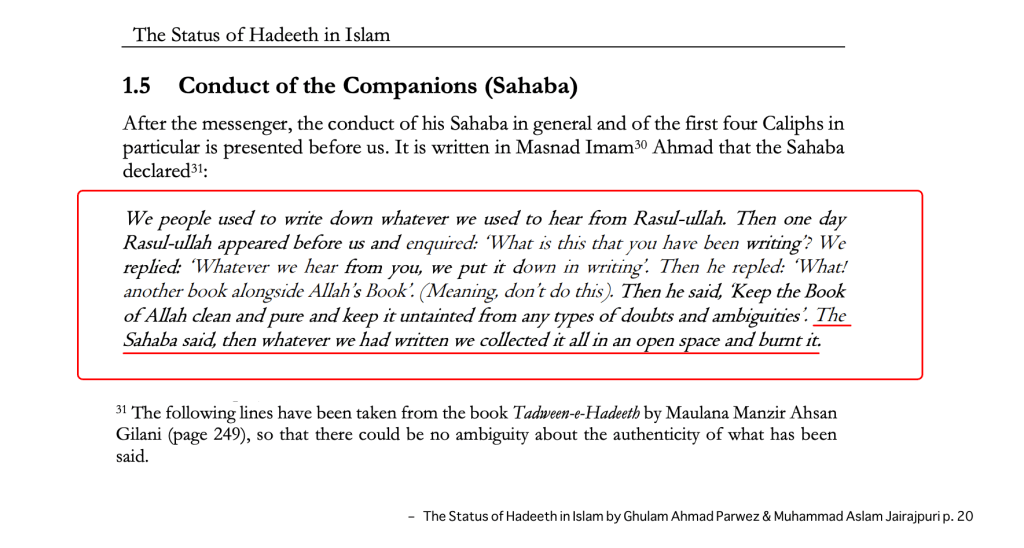
“Abu Sa’id al-Khudri, Zayd ibn Thabit (the Propeht’s own scribe), and Abu Hurayra, related traditions to this effect; and many other Companions and Successors are reported to have disliked and discouraged the writing of hadith. In particular, there are the names of Ali, Ibn Mas’ud, Ibn ‘Abbas, Abd Allah ibn Umar, Abu Musa, al-Ash’ari, Ibn Sirin, al-Dahhak, Abida al-Madaniyya, Ibrahim al-Nakha’i, Ibn al-Mu’tamir, al-Awza’i, Alqama ibn Qays, Ubayd Allah ibn Abd Allah, and others. Some such authorities (like ‘Ali and Ibn ‘Abbas), are, as we have already seen, also reported to have written hadiths down, and possessed sahifas and other books. Others (for instance al-Dahhak, Ibrahim, and ‘Alqama) are said to have objected to the writing of hadiths in book form, but not to making such notes as might serve to help memory. Others still (such as Ibn Mas’ud and Ibn Sirin) are said to have opposed the writing of hadith in any form.” – p. 25
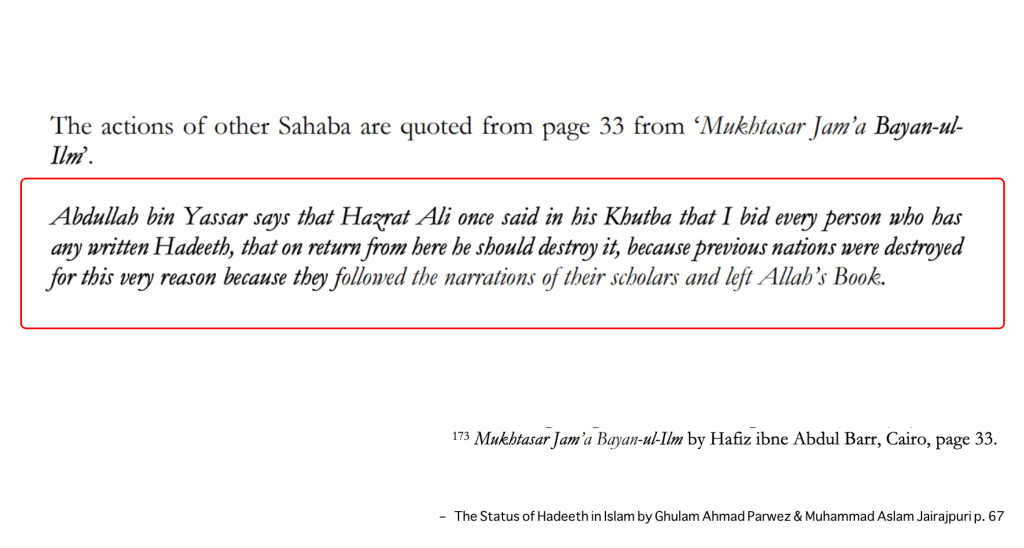
Hadith Compilations
“According to Zurqani, as Goldziher has pointed out, it [the Muwatta of Imam Malik] contains 1,720 hadiths of which 600 have isnads, 222 are mursal, 613 are mawquf, while 285 stop either at a Companion or a Successor (i.e. are either mawquf or maqtu). According to al-Ghafiqi, the total number of hadiths in the twelve versions of the Muwatta’ is 666, out of which 97 differ in the different versions of the book, while the rest are common to all the various recensions.” – p. 8
“The Musnad of Ibn Hanbal contains more than 30,000 hadiths narrated by about 700 Companions.” – p.11
Note: While the Musnad of Ibn Hanbal carried many forged traditions, as mentioned above, it also states that he believed that his collection contained all the authentic Hadith in existence.
“The Muwatta of Imam Malik contains traditions of only 98 Companions. The Musnad of al-Tayalisi contains the hadiths of some 281 Companions, while the Musnad of Imam Ahmad ibn Hanbal includes hadiths narrated by about 700 Companions. The Two Sahihs of Bukhari and Muslim contain the material of 208 and 213 Companions respectively, of whom 147 are common between the two great works.” – p. 18
Problems with Bukhari
Note: We have no book from Bukhari explaining the biographical work he did to verify the trustworthiness of his isnads in his Sahih compilation. Not only that it looks like such books did not exist until the third century.

Fabricated Isnads and Matn
Note: If Hadith with sound isnads cannot be trusted, then the entire isnad system cannot be trusted.
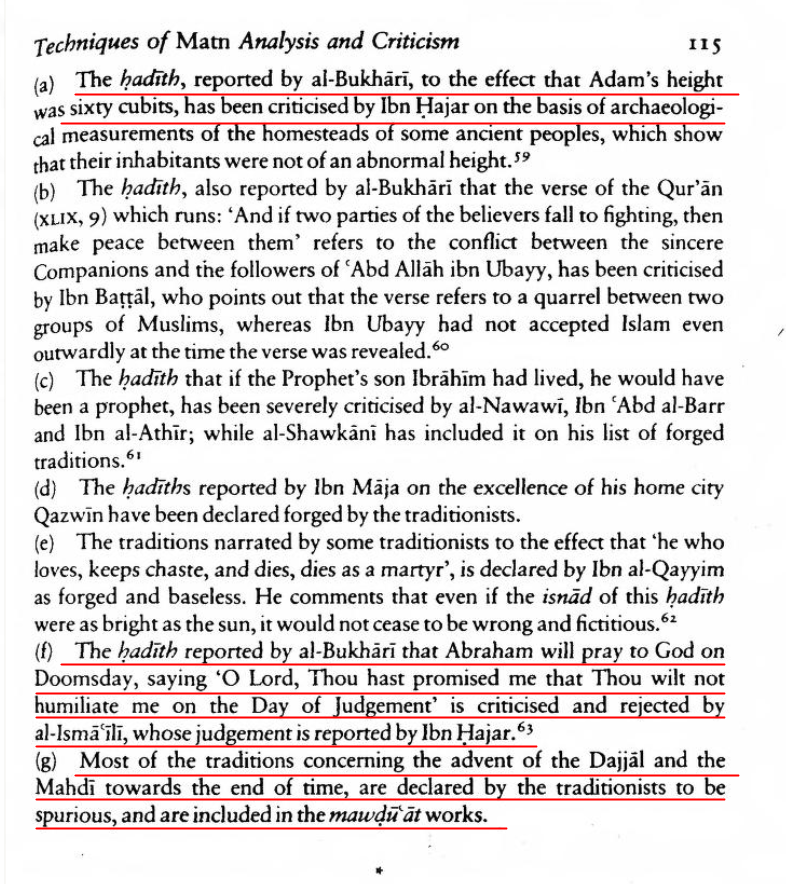
Mass Fabrication of Hadith By Enemies
Mass Fabrication of Hadith by Pious
Mutawatir Definitions
